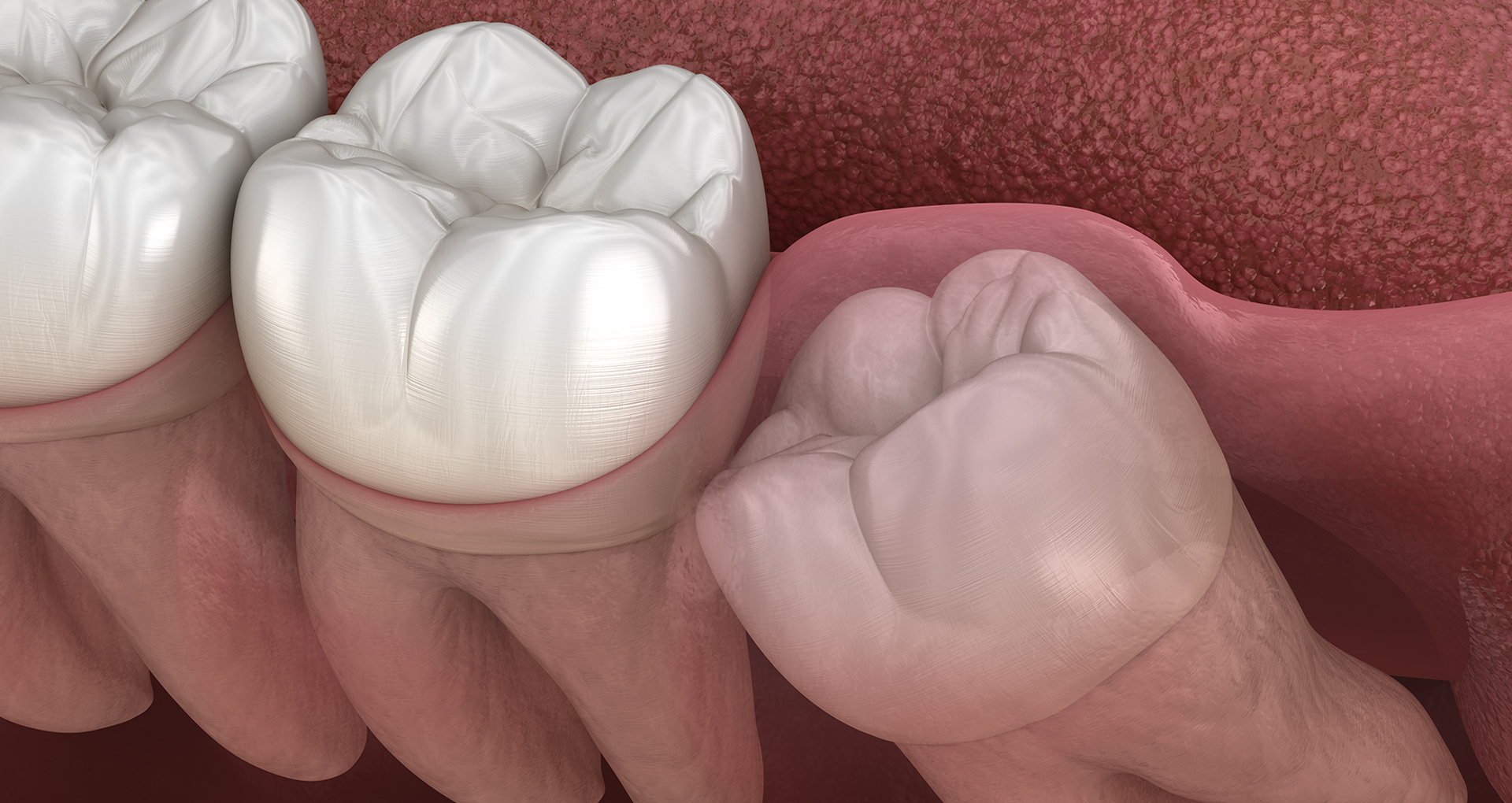

A wisdom tooth, also known as a third molar, is the last tooth to erupt in your mouth. A wisdom tooth growing in its space generally occurs between the ages of 15 and 25. Most individuals are born with 4 wisdom teeth. Wisdom teeth often become impacted due to limited space. An impacted wisdom tooth or impacted wisdom teeth occurs when there is a lack of space in your jaw and its growth and eruption are prevented by overlying gum, bone or another tooth. Wisdom teeth symptoms include pain, swelling, infection, and deep periodontal pockets. Wisdom teeth pain can be severe and may be an indication of a dental emergency requiring immediate dental removal of wisdom teeth. Because the area in question may be infected, wisdom teeth pain relief will occur upon dental removal of the wisdom tooth or teeth causing the pain.

Certainly. The majority of people should look into wisdom teeth removal. There’s a slight chance that wisdom teeth will grow into a proper position where they can be easily cleaned. However, over 85% of people will have impacted wisdom teeth, meaning there isn’t enough room for the wisdom tooth to grow into the proper position. Impacted wisdom teeth cause irritation or infection of the gums, or crowding and decay of other teeth, ultimately leading to wisdom teeth pain. Dr. Gandhi is a board-certified oral and maxillofacial surgeon who specializes in procedures such as dental extractions, dental emergencies, dental removal, tooth extraction, wisdom tooth removal, or wisdom teeth extraction.
Some patients will experience discomfort from pressure, infection, inflammation or irritated and deep periodontal pockets when their wisdom teeth emerge. The only way to know for sure if your wisdom teeth need to be removed is to have an oral surgeon evaluate them by taking a Panoramic X-ray or 3D CT scan. Despite the considerable concern regarding impacted wisdom teeth, several recent studies found that third molars which have broken through the tissue and erupted into the mouth, in a normal, upright position, may be just as prone to disease as those third molars that remain impacted. Not all problems related to wisdom teeth are painful or visible. Damage can occur without you being aware of it. No one can predict when wisdom teeth complications will occur, but when they do, wisdom teeth pain can be more severe and difficult to treat, thus complicating teeth surgery. This is why a comprehensive consultation with Dr. Gandhi, a sedation dentist, who specializes in wisdom teeth extraction, dental removal, and teeth surgery, is essential.

It is common for wisdom teeth extraction to be performed in the late teens to early twenties. The best time to have wisdom teeth removed is when the roots are ½ to ⅔ developed, and the only way to know this is with an X-ray examination. Wisdom teeth can cause problems at any age after the teenage years. However, the risk of complications or a dental emergency with teeth extraction goes up the older you get. It is recommended to have a comprehensive consultation and treatment plan put together, which includes wisdom teeth removal cost and a Panoramic X-ray or 3D CT Scan.
Wisdom tooth removal is now more comfortable than ever. Using IV sedation and local anesthetics, Dr. Gandhi can make your dental extraction experience more pleasant than ever. After the gums are numbed, Dr. Gandhi meticulously opens the gums up so they can be gently pushed aside. The wisdom tooth is then exposed and extracted. Most often the tooth is dislodged in one whole piece. Occasionally the tooth is removed in two pieces to limit risk to the underlying nerve, or because smaller pieces are easier to remove, making for a smoother dental removal. After the wisdom tooth removal, the gums are closed with sutures to help accelerate the healing process.

The teeth surgery procedure itself is mostly painless. With sedation dentistry you’ll be relaxed, comfortable, and unaware of the passing time. In addition to sedation, local anesthetics numb the mouth to anything that could be painful. Most people experience some soreness during the healing period following surgery. At Firewheel Dental Implants and Periodontics, Dr. Gandhi utilizes recent advances in medicine and state-of-the-art technology to allow patients to have wisdom teeth pain, to undergo their dental removal in a manner that promotes rapid healing and minimal post-operative discomfort. We are one of only a handful of centers that has our own 3-D CT scanner in-house allowing us to take 3-D imaging on patients to verify nerve positions, ensuring safety and minimal trauma.
Soreness and swelling from a dental removal may last several days. Ice packs and prescription pain medication help limit any pain during the healing period. The sockets normally will close and fully heal in three to four weeks. As with any teeth surgery, you are likely to experience pain, swelling, and some bleeding. The recovery period after oral surgery can take several days, and in some cases, there may still be swelling and discomfort for a week or more. Dr. Gandhi recommends using ice packs, while enjoying soft foods, and keeping your mouth clean by rinsing with simple salt water. Non-woven sponges and moistened black tea bags can aid in the slowing of any bleeding. If you notice any unusual symptoms like discharge, severe pain or a fever, call us here at Dental Implants and Periodontics right away. While complications post dental extraction, such as an infection, are rare, they are possible.

While your mouth recovers from a tooth extraction, it is imperative not to disrupt the blood clot or irritate your healing gums. You should not consume solid foods, alcohol, coffee, soda or hot beverages in the first few days following your teeth extraction. The length of recovery depends a lot on how bad the wisdom teeth impaction was and how they were erupting. There are plenty of things you can do to make teeth removal recovery time easier. Definitely, plan on taking it easy for a few days; you can resume your normal activities after the first day in most cases, but for about a week you don’t want to do anything that could dislodge the blood clot from where the wisdom teeth extraction took place. For the pain, Dr. Gandhi can prescribe pain medicine and pain relievers. To help with the swelling, place an ice pack over the swollen teeth surgery area. The cold helps to reduce the inflammation and ease any dental removal pain. Avoid brushing, spitting, flossing and rinsing for 24 hours. After that, you can gently brush your teeth. Rinse your mouth with salt water frequently to help keep it clean and prevent an infection. You want to eat a soft-food diet for the first day or more and then slowly move to semi-soft foods when you are ready. The teeth extraction recovery period can take several days and in some cases, there may still be swelling and discomfort for a week or more.

Although rare, most patients describe the pain from dry socket symptoms as a dull, throbbing pain to a sharp stabbing pain that is aggravated by eating and is tender to the touch. The pain usually starts about three to four days after the wisdom teeth removal, and rarely goes away by itself. After extraction, a blood clot forms in the tooth socket, the space that once held the tooth, and seals the area so that it can heal. A dry socket occurs when the blood clot is dislodged, exposing the bone and nerves. The first five or so days after wisdom teeth removal are the most critical, and it is during this time that the risk for a dry socket is the highest. The most common cause of a dry socket is smoking or having a history of smoking within 72 hours of surgery. A dry socket can be very painful. If you think you have this condition, contact us immediately.

Start with a Consultation with Dr. Gandhi. At this consultation, the doctor will create a customized treatment plan just for you. You’ll learn exactly how much the procedure will cost without having to worry about any surprise fees. And remember: a consultation is a conversation. It’s not a commitment. You have nothing to lose and a beautiful smile to gain.
